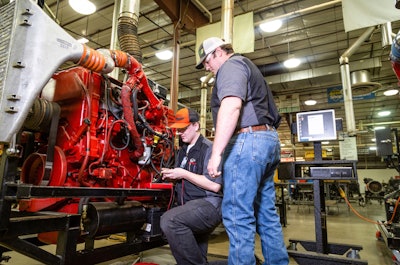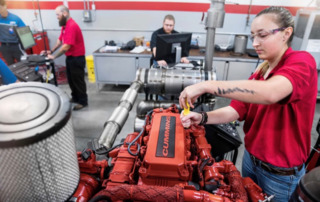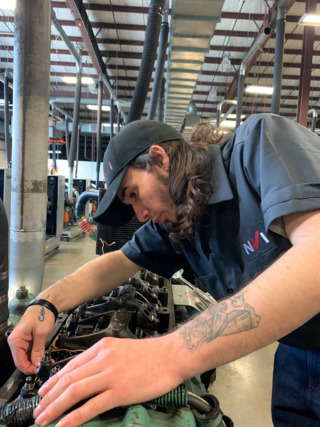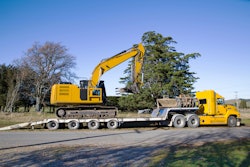
What are some of the biggest differences between a diesel tech student from 10 years ago and one entering the field today?
According to several trade school officials interviewed by CCJ, current students have more computer skills, greater knowledge of industry players and more opportunities, thanks to shops that are eager to roll out the red carpet amid a diesel tech shortage.
The American Transportation Research Institute listed a shortage of diesel technicians as one of its top-10 industry concerns in 2021, and the U.S. Bureau of Labor Statistics expects the field to grow at a rate of 28,000 jobs per year through 2030.
Some shops are so eager to fill positions they're bypassing trade schools and going straight to high schools, where fresh graduates with no formal training and no tools — save for perhaps one of their best tools of all, a smartphone — are eager to explore their best options online and catch good-paying tech jobs while circumventing the classroom.
Sandra Jordan, director of career services at Lincoln Tech’s Nashville campus, said hot demand for diesel technicians has them competing for students alongside shops that will initially put untrained recruits to work changing oil and tires before leading them into diagnosis and repair.
 Universal Technical Institute has had more women signing up for diesel courses than in years past. "We think that there are tremendous opportunities for young ladies to grow in this industry, but regrettably it's a smaller percentage, though it is most certainly a growing percentage over the last couple of years," said UTI regional vice president of operations Robert Kessler who also serves as president of UTI’s Exton, Penn. campus.UTIThough Jordan said students will miss out on beefing up their resume with a vocational tech diploma and possibly lose a well-rounded, brand-agnostic approach to training, it’s a risk that a growing number of cash-hungry students are willing to take after quickly weighing their options online and at career fairs where cash-wielding service centers stand at the ready.
Universal Technical Institute has had more women signing up for diesel courses than in years past. "We think that there are tremendous opportunities for young ladies to grow in this industry, but regrettably it's a smaller percentage, though it is most certainly a growing percentage over the last couple of years," said UTI regional vice president of operations Robert Kessler who also serves as president of UTI’s Exton, Penn. campus.UTIThough Jordan said students will miss out on beefing up their resume with a vocational tech diploma and possibly lose a well-rounded, brand-agnostic approach to training, it’s a risk that a growing number of cash-hungry students are willing to take after quickly weighing their options online and at career fairs where cash-wielding service centers stand at the ready.
“I call it a piranha world out there,” Jordan said. “I've never seen anything like it in all the years I've been in higher education and career services. Employers are desperate, and there are desperate measures out there for them to take to get diesel and auto technicians.”
While it’s not clear how many students are skipping out on trade schools and heading straight to service bays, according to the 2022 State of Diesel Technicians report, a survey-based report produced by Randall Reilly and sponsored by Shell Lubricant Solutions, only about 42% of current technicians have completed a vocational/trade program in diesel engine repair while 44% entered the field with a high school diploma and entered into an apprenticeship.
Robert Kessler, regional vice president of operations at Universal Technical Institute and president of UTI’s campus in Exton, Pennsylvania, said demand for its students is at an all-time high, and they’re primed to pounce on the best jobs with smartphones in hand.
“They're shopping employers, and they're searching and hunting down where the best opportunities are with much more knowledge. No doubt about it,” Kessler said.
Social media, texting and word-of-mouth can spread the word fast about the latest, greatest jobs.
 According to the 2022 State of Diesel Technicians report, a survey-based report produced by Randall Reilly and sponsored by Shell Lubricant Solutions, old school methods like word of mouth and going directly to an employer are how current technicians find jobs, while younger and would-be techs lean more heavily on technology.
According to the 2022 State of Diesel Technicians report, a survey-based report produced by Randall Reilly and sponsored by Shell Lubricant Solutions, old school methods like word of mouth and going directly to an employer are how current technicians find jobs, while younger and would-be techs lean more heavily on technology.
“Word gets around campus very quickly for our students about the next great opportunity, and frankly, which companies take the best care of their entry level technicians, meaning they're offering mentoring, coaching and allowing students the ability to start out at an entry level and get their feet underneath them and to grow with the organization,” Kessler said.
With attractive recruiting efforts coming constantly both in-person at trade schools and online, technicians entering today’s workforce are frequently expecting and getting more VIP treatment than techs in the past.
“Maybe 10 years ago the demands and the expectations were much, much higher in terms of Day One versus today when organizations see the need to mentor, coach and really provide a great learning environment for new employees,” Kessler said.
Jim Mathis, president and CEO of WyoTech in Laramie, Wyoming, said the competition for diesel techs is working in their favor and they know it. Young techs of today are “masters at their phones,” Mathis said, and are quickly discovering promising jobs through a few clicks on their screen.
If shops want to hold on to talent, no matter if they hail from vo-tech or straight from high school, Mathis said, they’ll have to up their game.
“These students have so many opportunities, and if they don't like what you have to offer, even if they start at that company, they'll walk across the street or go to someone that does offer what they want,” he said.
Handy with a smartphone, but a wrench?
While today’s smartphone-equipped diesel students are more industry-savvy than their counterparts from a decade ago, phone use can come at a price, according to Rachel Obptande, dean of education at Lincoln Tech’s Nashville campus.
 As with the other vo-tech schools CCJ interviewed, most of the students at New Village Institute come straight out of high school versus another career path. "I I think it's a little easier for a student that's right out of high school because they still have that family support," said NVI Campus Director NVI Chris Barton.New Village Institute“When they get into shops, there's a whole lot of Googling done to find the parts, the processes or whatever else technicians may need to know,” Obptande said. “So they've got that capability and we can play on that. We've just got to make sure we can capture their interest long enough to teach them something in the process.”
As with the other vo-tech schools CCJ interviewed, most of the students at New Village Institute come straight out of high school versus another career path. "I I think it's a little easier for a student that's right out of high school because they still have that family support," said NVI Campus Director NVI Chris Barton.New Village Institute“When they get into shops, there's a whole lot of Googling done to find the parts, the processes or whatever else technicians may need to know,” Obptande said. “So they've got that capability and we can play on that. We've just got to make sure we can capture their interest long enough to teach them something in the process.”
Smartphone use in class can be a tough balance, Jordan pointed out, since service centers have told her that they’re looking for students who can use their smartphones productively on the job for things like taking photos of repair work.
Plus, there’s a growing number of apps that continue to push the ongoing integration of handheld computer devices, diagnostics and repair, and today’s students are happy to oblige.
"They're masters at their phones and [other computer devices]," Mathis explained. "They are not afraid of it like they were 15 or 20 years ago."
While smartphone use can prove too distracting at times for students and keep them from learning valuable lessons in class, they can also miss out on other helpful experiences, thanks to a reduction in shop classes at high school and reduced exposure to DIY vehicle repair at home.
“I would definitely say they have more of a technological advantage over tech students that we've had from say 10 years ago,” said Adam Duplin, diesel program coordinator at New Village Institute in Blairsville, Pennsylvania. “These students have grown up being more exposed to computers and computer operating systems and have a better idea of the language of computers.
“But the students that we're getting now are probably a little more green in the industry than the students of 10 years ago, since Mom and Dad aren't fixing the family car in the driveway like they were years ago,” Duplin continued. “The technological advancement of automobiles has less and less people doing their own maintenance on their vehicles.”
Not only that, but NVI campus director Chris Barton pointed out that high schools have continued to cut shop classes through the years.
[Related: Number of diesel tech grads falling as average age climbs]
“There's less exposure [for diesel students] as people look at spending money in school systems and where to spend it,” Barton said. “Vo-tech programs in some places fall victim to that and get cut or reduced. Pennsylvania is actually pretty lucky. They've got a pretty robust vo-tech system.”
Lincoln Tech’s Nashville Campus President David Whiteford said aspiring techs also risk sacrificing additional experience when bypassing trade schools — experience that can make them more competitive and a more valued asset for the companies they serve.
“The hens will come to roost in a couple years from now when things iron out a little bit, inflation comes down, and job shortages are starting to be filled,” Whiteford said. "Right now they're delaying their education. They're settling for underemployment and not really training for their entire career up front.”
The 2022 State of Diesel Technicians report found that less than half of trucking techs are ASE certified but just more than half held at least one OEM certification.
 Data compiled in the 2022 State of Diesel Technicians report shows that fleet-level technician training methods can vary.
Data compiled in the 2022 State of Diesel Technicians report shows that fleet-level technician training methods can vary.
Comfort zone challenges
Though today’s tech students are sharply in tune with their smartphones and tech trends, their motivation toward embracing new experiences outside their digital routines is on the decline, according to Obptande.
“A lot of the kids we get are very insecure,” she said. “They're not going to speak up. They're happy with just getting by, so they don't know to go and get that roadmap to success.”
Jordan said students have also been less willing to pursue jobs away from family and have become more brand-focused following exposure to “20 years of marketing.” From YouTube to Instagram, clever ads and endless forums, students come to class knowing what trucks and powertrains they like most and will steer clear of brands they find to be outside their circle of favorites, Jordan said.
“They’ve become very particular in what they want, the newer generation,” Jordan explained. “And they're also very particular about what they want after Covid. I've seen a new shift in students post-Covid that say, ‘I don’t want to move away from home. I don't want to relocate. I want to just stay by my family. That's important to me.’”
Whiteford said that though students have “way more ability, think digitally and can do multiple tasks at one time” the notion of moving away for a higher paying job with more opportunities is often not enough to lure them out of their comfort zone.
“They have a fear of being employed where they're going to leave all their friends and their family,” Whiteford said. “It's a very interesting dynamic with this generation.”
Social challenges aside, Kessler said, students remain motivated to dive into the latest tech, from smartphones to diesel aftertreatment.
“When you think about today's students, their everyday lives are surrounded by high tech and that's what they really attach themselves,” Kessler said. “Our students are great at excelling in STEM classes. These are the students that are great problem-solvers and are into the newest and most recent technology breakthroughs, and they really like working with their hands and getting their hands dirty and fixing things.”










